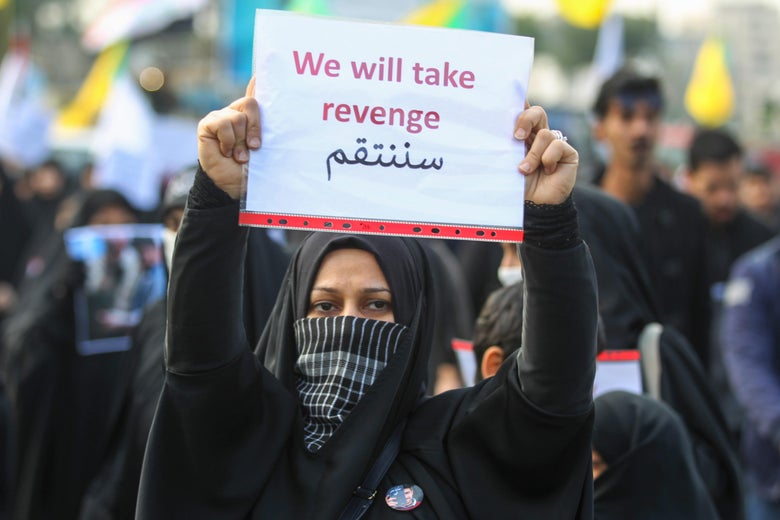
An Iraqi woman holds a placard during the funeral of Iranian military commander Qasem Soleimani, Iraqi paramilitary chief Abu Mahdi al-Muhandis and eight others in Baghdad’s district of al-Jadriya, in Baghdad’s high-security Green Zone, on January 4, 2020.
AHMAD AL-RUBAYE/Getty Images
Tens of thousands of people marched in Baghdad on Saturday chanting “America is the Great Satan” and “Revenge is coming” as they mourned Maj. Gen. Qasem Soleimani, commander of the Iranian Revolutionary Guard’s elite Quds Force, and Iraqi militia leader Abu Mahdi al-Muhandis, who were killed in a U.S. airstrike. Officials from Iraq and Iran took part in the mourning procession, including Prime Minister Adel Abdul Mahdi, putting on display just how much regional tensions have soared since the attack as Iranian leaders vowed to attack U.S. interests. Muhandis and the other Iraqis killed in the strike will be buried in Najaf while Soleimani will be buried in his hometown of Kerman in southeast Iran.
President Donald Trump said Friday he ordered the killing of Soleimani “to stop a war” rather than start one, adding that the action should have been taken earlier. “What the United States did yesterday should have been done long ago. A lot of lives would have been saved,” Trump said in from his Mar-a-Lago resort in Palm Beach, Fla. “We took action last night to stop a war. We did not take action to start a war.” According to Trump, Soleimani “was plotting imminent and sinister attacks on American diplomats and military personnel.”
Yet mourners in Iraq seemed eager for more conflict, not less, as they chanted, “Death to America, death to Israel” and “We will take our revenge!” A day earlier, Iranian Supreme Leader Ayatollah Ali Khamenei vowed that action would be taken against the “criminals “ who killed Soleimani. For now though analysts say it’s unclear whether the threats would turn into a reality. Experts say “the country had to balance its need to show resolve against a staunch enemy and its reluctance to thrust itself into a full-scale war with the United States, a much stronger power,” notes the New York Times.
Iranian military leaders are warning that U.S. facilities and other American military assets in the region are at risk, including a key Gulf waterway through which lots of the world’s oil is transported. “Thirty-five vital American positions in the region are within the reach of the Islamic Republic, and Tel Aviv,” Brig. Gen. Gholamali Abuhamzeh, an Iranian commander, was quoted by the Tasnim News Agency. “The Strait of Hormuz is a vital thoroughfare for the West, and a large number of American destroyers and warships cross the Strait of Hormuz, the Sea of Oman and the Persian Gulf,” he added.
China added its voice on Saturday to the international condemnation of the attack that killed Suleimani. “The risky military action by the United States violates the fundamental norms of international relations and will worsen regional tensions and turmoil,” China’s foreign minister, Wang Yi, said in a phone call with his Iranian counterpart, Mohammad Javad Zarif. “China opposes the use of armed force in international relations.”
Readers like you make our work possible. Help us continue to provide the reporting, commentary and criticism you won’t find anywhere else.
Join Slate Plusfrom Slate Magazine https://ift.tt/2MRvbgc
via IFTTT
沒有留言:
張貼留言